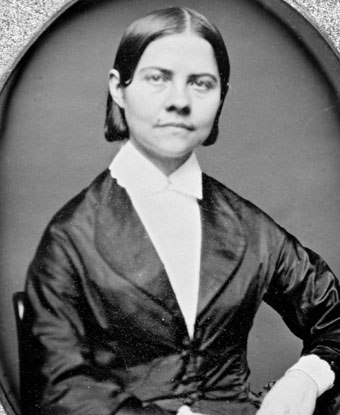Last updated: January 12, 2026
Person
Lucy Stone

Steadfast in her belief of self and ability to change the world, Lucy Stone stands as a historical titan, her "Unapologetic Life" a model of a revolutionary.
Born near West Brookfield, Massachusetts in 1818,[1] Stone graduated from Oberlin College in 1847, becoming the first Massachusetts woman to earn her bachelor's degree. At her graduation ceremony, she met radical abolitionists William Lloyd Garrison and Frederick Douglass, an uncanny foreshadowing of her future work as a lecturer for the abolition and women's rights movements.[2]
In 1848, Stone began working as a paid lecturer for the Massachusetts Anti-Slavery Society. During that first year, she established herself as an exemplary abolitionist lecturer, a cause she continued to champion throughout her life. She traveled extensively and lectured tirelessly, exerting a gentle but commanding presence each time she stepped on stage to speak. In these early years of lecturing for antislavery, Stone began to speak also for women's rights.
Questioned when she dared to speak for the cause of the rights afforded woman at an antislavery meeting, Stone replied, "I was a woman before I was an abolitionist."[3] By mid-1851 Stone ended her contract with the Massachusetts Anti-Slavery Society to dedicate herself completely to the women's suffrage movement.[4] As a principal organizer of the 1850 Worcester First National Woman's Rights Convention and publisher of the Woman's Journal, Stone strove to use her voice as a force for change. In the words of her daughter Alice Stone Blackwell, "Her adventures during the next few years would fill a volume. No suffrage association was formed till long after this time. She had no cooperation and no backing, and started out absolutely alone."[5]
Throughout her decades of work, Stone continued to support progress for both women and the enslaved. In 1869, a debate erupted within the women's rights movement over the 15th Amendment, an amendment guaranteeing the right to vote for African American men. Some, including Elizabeth Cady Stanton and Susan B. Anthony, opposed the 15th Amendment because it did not include women (particularly white women). Stone herself remained true to abolitionist ideals and used her influence to support the amendment's passage. She and her allies recognized the value of progress, even when not universal. This divergence of beliefs created a schism within the women's rights movement. Following its third annual convention in May 1869, the American Equal Rights Association, which advocated for both the rights of African Americans and women, dissolved as a casualty of this split. In response, each side formed their own organization to carry out the cause of women's suffrage: Stanton and Anthony established the National Woman Suffrage Association while Stone and Julia Ward Howe, among others, founded the American Woman Suffrage Association.[6]
Stone not only labored for the movement, she upheld it in each of the decisions she made in her personal life. Despite reservations about the institution of marriage, in 1855 Stone married Henry Browne Blackwell. From the outset, their partnership was revolutionary. At the ceremony Stone and Blackwell read a Marriage Protest, a statement the two wrote together denouncing all legal portions of marriage in which a woman became subservient to and property of her husband.[7] Stone retained her maiden name, a decision which often proved controversial and left an ongoing legacy.[8] After the birth of her daughter Alice in 1857, Stone took a brief hiatus from her active role in the women's rights movement, returning with all of her previous vigor less than a year later at a time when women rarely worked outside the home. While at home nursing young Alice, in protest to her lack of a vote, Stone refused to pay her city taxes, forcing the town constable to auction off her household items to pay the disputed tax.[9] Stone's 1858 refusal to pay her taxes preceded an 1873 speech she delivered at Faneuil Hall during a Women's Tea Party in which she decried the ability of the government to tax women without endorsing suffrage. Stone proclaimed, "Great Britain never dared to do to the colonies, what Massachusetts does to the women of this State to-day."[10] Without hesitation, Stone paralleled the plight of the Thirteen Colonies with the disenfranchisement of women in much the same way she often linked the oppression of women with the enslaved in her speeches.
The woman who decisively merged her political and private spheres lived to witness the abolition of slavery, but not the ratification of the 19th Amendment which guaranteed women’s suffrage. In 1893 as she lay dying of stomach cancer, Stone reflected, "I am glad I was born, and that at a time when the world needed the service I could give."[11] Her words remain a statement truly befitting the woman, suffragist, and abolitionist who worked relentlessly to secure freedom for the enslaved and rights for women. With the dying words, "Make the world better," the indefatigable Lucy Stone departed this world, a bone fide pioneer of her time.
Footnotes:
[1] Joelle Million, Woman's Voice, Woman's Place: Lucy Stone and the Birth of the Woman's Rights Movement (Westport, CT: Praeger Publishers, 2003): 6.
[2] Sally G. McMillen, Lucy Stone: An Unapologetic Life (Oxford: Oxford University Press, 2015): 61-62.
[3] Ibid., 71-72.
[4] Million, Woman's Voice, 112.
[5] Alice Stone Blackwell, Lucy Stone: Pioneer of Woman's Rights (Boston: Little, Brown, and Company, 1930): 90.
[6] McMillen, Lucy Stone, 178 - 183.
[7] Ibid., 128-129.
[8] Million, Woman's Voice, 196.
[9] McMillen, Lucy Stone, 139-140.
[10] Lucy Stone, “Speech of Lucy Stone,” (speech, Faneuil Hall, Boston, December 15, 1873), Gerritsen Collection of Women’s History, Microfilm of the Boston Public Library.
[11] McMillen, Lucy Stone, 246; 248.
